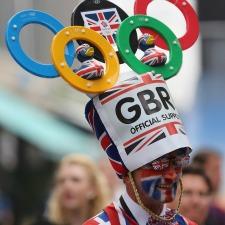BROOKE GLADSTONE: The London Summer Games are taking unprecedented steps to safeguard the security of their sponsors. For instance, Olympic Guard Police were told to empty their snacks into clear plastic bags so they wouldn’t inadvertently advertise competing brands. Officials backtracked after angry officers complained to their superiors, but it’s a fair indication of the confusion and anxiety the new rules have wrought. Esther Addley, senior news writer for the Guardian newspaper, is covering the Olympics. Welcome to On the Media.
ESTHER ADDLEY: Thanks for having me.
BROOKE GLADSTONE: So, the Independent reported that even as London was scrambling for staff to secure the Games, hundreds of highly organized uniformed Olympic copyright cops stood ready to enforce the sponsors’ marketing deals. Is that true?
ESTHER ADDLEY: It is true. There are just shy of 300 “branding police,” as they have been called, to patrol the venues where the competitions are being held and just check that there’s nobody trying to sneak an unauthorized branding opportunity past the strict rules that have been put in place.
BROOKE GLADSTONE: London organizers gave businesses a list of key words to avoid.
ESTHER ADDLEY: That’s right. There’s two different lists, and you’re not allowed to use two words from List 1. And I’ll tell you what those words are: Games, Two-Thousand and Twelve in words, 2012 in numbers or Twenty-Twelve in words. So you can’t say, “We’re supporting the 2012 Games here at the Dog and Duck in Hackney because that has two words from that list. And also barred is using one of those words with one of the second list, which includes the words London, medals, sponsors, summer and gold, silver or bronze. So you can see that there’s an awful lot of opportunity to fall into the trap where the organizers would deem that your marketing material or your advert was in breach of their law.
BROOKE GLADSTONE: What are the potential penalties for violating these rules?
ESTHER ADDLEY: There’s fines available up to about 20,000 pounds. And what’s interesting about this law is it goes beyond kind of copyright law. This actually introduces a criminal offense, so you could technically be criminally prosecuted. It’s really been described as some of the most draconian legislation in this area that’s ever been introduced. Some marketing experts have said we’re getting into a situation where businesses aren’t able to capitalize on this great economic opportunity because people are afraid almost to celebrate the Games in that way.
BROOKE GLADSTONE: Let’s talk about how these rules would affect the athletes themselves. They have Twitter and Facebook accounts.
ESTHER ADDLEY: The athletes have been given quite clear rules about what they can and can’t do on Twitter in the Games time period. They can’t mention their brands of their own personal sponsors, if those sponsors aren’t official Olympic sponsors.
BROOKE GLADSTONE: So I scored some tickets, there was this fantastic moment. I, I caught it on my phone. Could I upload it? Could I send it to my friends?
ESTHER ADDLEY: If you are sitting in the Olympic Stadium, you have a great view of the 100 Meters Final, you happen to get a fantastic shot on your smart phone, they don’t want you commercially exploiting that image. And they also don’t want you uploading to YouTube 10 seconds of fantastic action that might be, in its own way, even more revealing than what the BBC or NBC cameras can show. But, in most cases, posting, certainly, images will be fine to social media, I would think.
BROOKE GLADSTONE: What do you think is the most extreme example of copyright protection that you’ve seen so far, since this process was inaugurated?
ESTHER ADDLEY: You can’t buy with any other credit card, apart from Visa. And I noticed when I tried to buy a Coke, of course, from a machine the other day that even it wouldn’t accept cash. I had to pay by Visa. So I don’t know whether Visa see cash as a competitor, but some of those things arguably make life, if anything, just more difficult for spectators.
BROOKE GLADSTONE: Esther, thank you very much.
ESTHER ADDLEY: You’re welcome.
BROOKE GLADSTONE: Esther Addley is a senior news writer for the Guardian newspaper.
